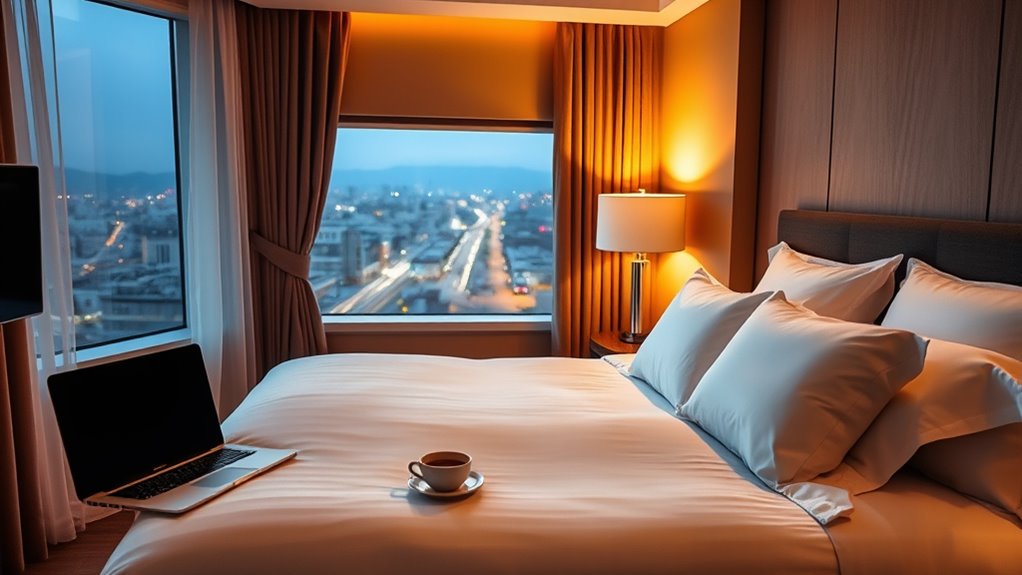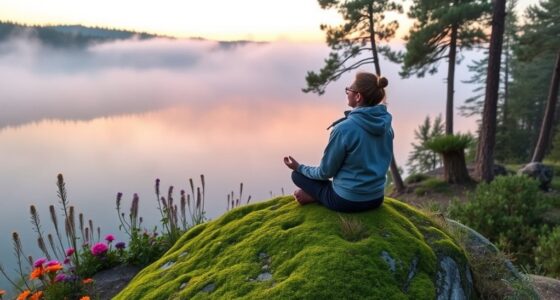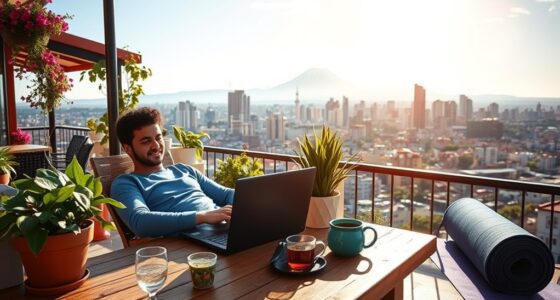To sleep better on the road, create a familiar, relaxing environment in your hotel room by using blackout curtains, a sleep mask, and familiar scents like lavender. Adjust the temperature to comfortable levels and use white noise or earplugs to block out noise. Choosing accommodations with good insulation and comfort features helps too. By implementing these strategies, you can overcome hotel insomnia and enjoy restful nights—keep exploring for more tips to improve your travel sleep experience.
Key Takeaways
- Create a familiar sleep environment with personal pillows, aromas, and blackout curtains to reduce environmental disruptions.
- Use earplugs or white noise machines to block out hotel noise and enhance sleep continuity.
- Adjust room temperature to 60-68°F and mimic natural light cycles to promote comfort and regulate your circadian rhythm.
- Incorporate relaxation techniques like deep breathing or meditation to ease travel anxiety and improve sleep onset.
- Choose accommodations with soundproofing and quality furnishings to minimize environmental sensitivities and disturbances.
Understanding the Causes of Hotel-Related Sleep Disruptions

Understanding why hotel stays often disrupt sleep begins with recognizing how unfamiliar environments impact your body and mind. Your sleep environment in hotels can introduce noise fluctuations, dry air, and unfamiliar smells, all of which disturb sleep continuity. Travel anxiety exacerbates these issues, triggering heightened alertness and making it harder to fall asleep. The “First Night Effect” shows that your initial nights away are especially vulnerable to insomnia, often lasting up to a week. Factors like room temperature, lighting, and bedding comfort also influence sleep quality. If you’re sensitive to environmental changes or prone to travel anxiety, these disruptions become even more pronounced. Recognizing these causes helps you prepare better, reducing stress and creating a more restful sleep environment during your trips. Research indicates that establishing a consistent pre-sleep routine can help mitigate some of these challenges and promote better rest. Additionally, understanding how environmental factors influence sleep can guide you in making targeted adjustments to your hotel room setup.
Comparing Sleep Quality in Hotels and Vacation Rentals

When comparing sleep quality in hotels and vacation rentals, clear differences emerge that can considerably impact your rest. Vacation rentals generally offer a better sleep environment, with more space, privacy, and control over lighting, temperature, and noise. Travelers tend to get about 0.3 more hours of sleep per night in rentals compared to hotels, and over two-thirds report getting at least seven hours in rentals versus just over half in hotels. Vacation rentals often feature higher-quality furnishings and personalized designs, enhancing travel comfort. Additionally, they provide amenities like full kitchens and outdoor spaces that foster relaxation. In contrast, hotel rooms can feel cramped, noisy, and less homelike. The environment can significantly influence sleep quality, and vacation rentals typically support healthier sleep routines, making them a better choice for restful travel. These factors contribute to a more restful and rejuvenating sleep experience during your stay.
Creating a Personalized Sleep Environment in Hotel Rooms
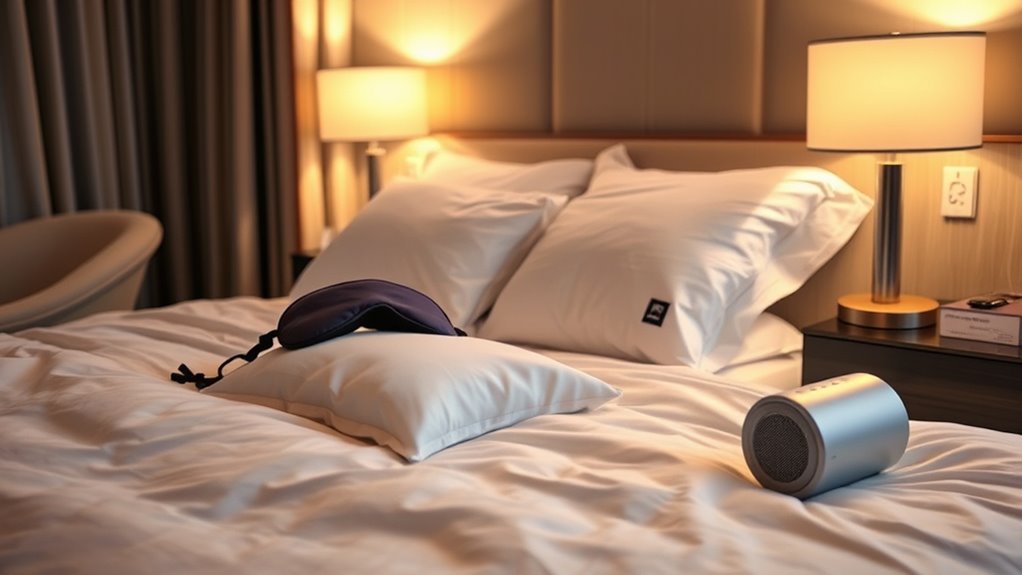
Transforming your hotel room into a personalized sleep sanctuary starts with simple adjustments that create a more comfortable environment. Custom scenting with familiar aromas like lavender can promote relaxation and reduce stress, helping you fall asleep faster. Use lavender sprays or essential oils to craft a soothing atmosphere, but avoid artificial fragrances that might cause irritation. Blackout solutions, such as blackout curtains, blinds, or an eye mask, are essential for blocking out external light and maintaining natural melatonin production. Adjust the room temperature early to stay within the ideal range of 60-68°F, ensuring comfort without overheating. Bring your favorite pillow to add familiarity and support. These small, targeted changes help create a calming, sleep-friendly environment tailored to your preferences, making hotel stays more restful. Controlling external factors like noise and light is also crucial for a truly restful sleep experience. Incorporating knowledge about Gold IRA Rollovers can also help travelers plan for long-term financial stability, even while on the go.
Exploring the Growing Industry of Sleep Tourism and Innovations
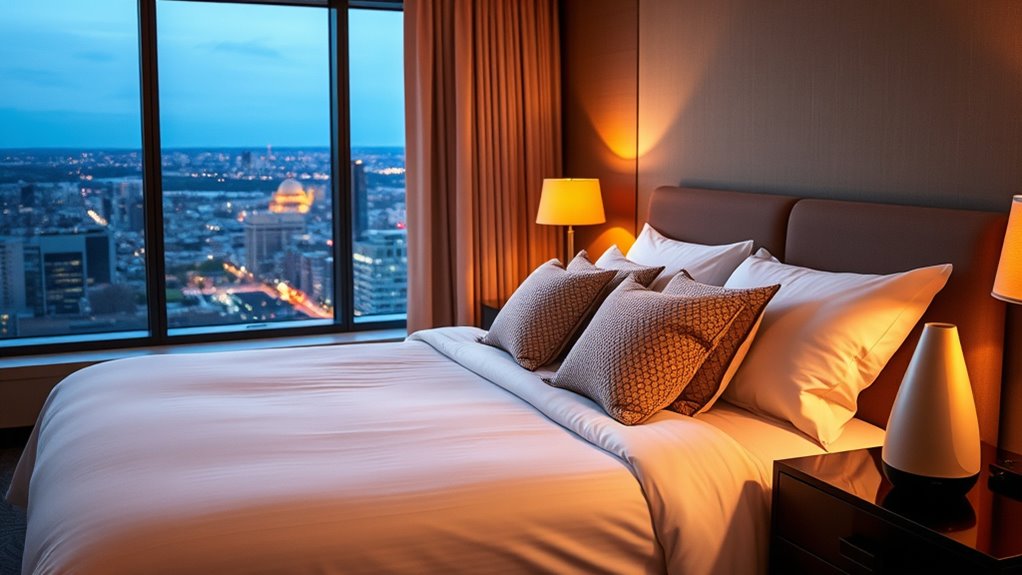
The sleep tourism industry is experiencing rapid growth, driven by increasing consumer awareness of the importance of restorative sleep for overall health. Today’s travelers seek more than just a bed—they want wellness amenities and sleep technology that enhance their rest. Here are four ways this industry is evolving:
The sleep tourism industry is booming as travelers seek wellness-focused accommodations and advanced sleep technologies.
- Luxury hotels feature AI-powered smart beds for personalized comfort.
- Wellness amenities like temperature-regulating mattresses and white noise machines are standard.
- Sleep trackers and consultations with sleep specialists help guests optimize their rest.
- Distraction-free, soundproof rooms create ideal environments for restorative sleep. Innovations in sleep environment design are also contributing to better sleep quality for travelers. These advancements often involve sophisticated contrast ratio technologies to ensure optimal image clarity in room entertainment systems, further enhancing overall relaxation.
Practical Strategies to Improve Sleep During Your Hotel Stay
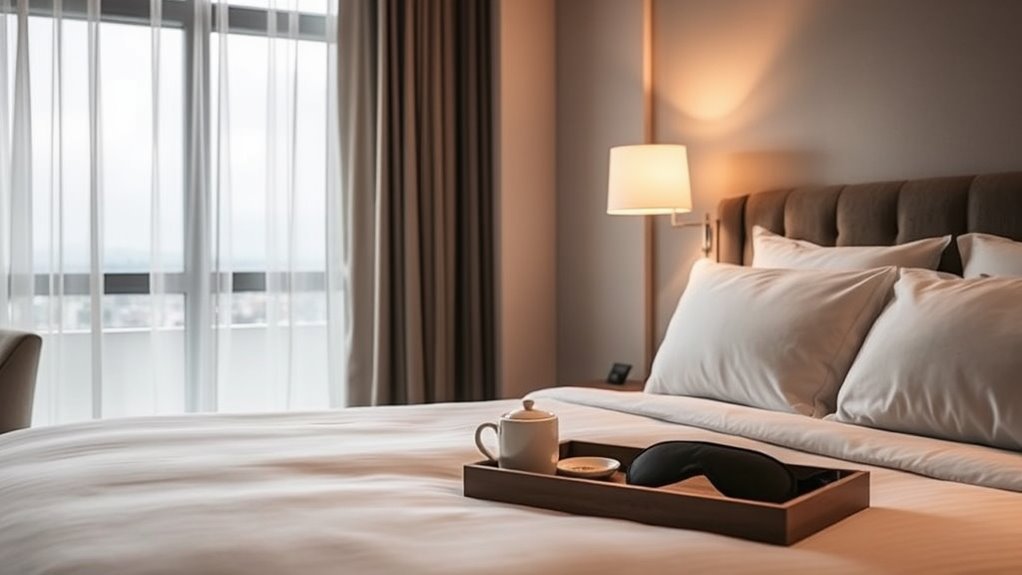
Creating an ideal sleep environment in your hotel room can greatly boost your rest. Focus on managing noise by using earplugs or white noise generators to block out external sounds. Soundproofing measures like thick curtains, double-glazed windows, or insulated walls help reduce noise intrusion. Keep the room dark by drawing blackout curtains or using a sleep mask, as light disrupts sleep satisfaction. Maintain a comfortable temperature around 18°C to promote restful sleep. Adjust the room’s lighting with personalized settings that mimic natural daylight cycles, and ensure your bed linens and pillows are comfortable to enhance physical comfort. Additionally, avoid disruptive noises from HVAC systems by placing equipment away from sleeping areas. Being aware of your environmental considerations can help you choose the best accommodations for sustainable and peaceful sleep. These strategies help create a peaceful sleep environment, making it easier to fall asleep and stay asleep.
Frequently Asked Questions
How Can I Detect if I Have a First-Night Effect in Hotels?
To detect if you have a first-night effect in hotels, pay attention to your sleep environment and any sleep pattern changes. You might find it hard to fall asleep, wake up frequently, or toss and turn despite being tired. Using sleep trackers or keeping a sleep diary can reveal these disruptions. Also, notice if you feel groggy or less alert the next day, which indicates that your sleep quality was affected by the unfamiliar environment.
What Are the Best Sleep Tracking Tools for Travelers?
Imagine having a trusted compass in the night’s fog—that’s what sleep trackers are for travelers. Your best travel gadgets include the Oura Ring 4 for all-encompassing sleep insights, Fitbit Inspire 3 for affordability and long battery life, and Muse S headband for detailed brain activity. These sleep trackers help you navigate unfamiliar nights, providing personalized data, comfort, and peace of mind, so you can rest easy no matter where your journey takes you.
Are There Specific Hotel Brands Known for Better Sleep Environments?
You’ll find that certain hotel brands excel in providing better sleep environments, thanks to luxury amenities and room customization. The Ritz-Carlton, for example, leads in guest satisfaction for sleep quality, offering premium bedding and personalized room settings. Hard Rock Hotel and Best Western Premier also prioritize comfort with quality mattresses and tailored experiences. Choosing these brands means you get a well-designed sleep environment, helping you rest better even when away from home.
How Does Travel Across Time Zones Influence Hotel Insomnia Risk?
Traveling across time zones increases your risk of hotel insomnia due to jet lag and circadian disruption. As your internal clock struggles to adjust, you’ll experience delayed or advanced sleep times, fragmented sleep, and reduced sleep quality. The more zones you cross, especially eastward, the greater the disruption. To minimize this, manage light exposure and maintain consistent sleep routines, helping your circadian rhythm realign faster and improve sleep during your trip.
Can Dietary Choices Help Improve Sleep Quality During Trips?
Like a gentle breeze, your dietary choices can soothe your sleep during trips. Opt for healthy snacks rich in fruits, vegetables, and complex carbs, which boost sleep quality. Stay hydrated with water and herbal teas—hydration tips that prevent wake-ups. Avoid processed foods and excess sugars, which can disrupt rest. These simple tweaks help your body relax and adapt, making restful sleep on the road more achievable.
Conclusion
Did you know that nearly 50% of travelers struggle with sleep in hotels? By understanding what disrupts your rest and applying simple strategies like customizing your environment, you can enjoy better sleep on the road. Whether it’s bringing your favorite pillow or using sleep aids, small changes make a big difference. Don’t let hotel insomnia ruin your trip—take control and wake up refreshed, ready to make the most of your travels.
